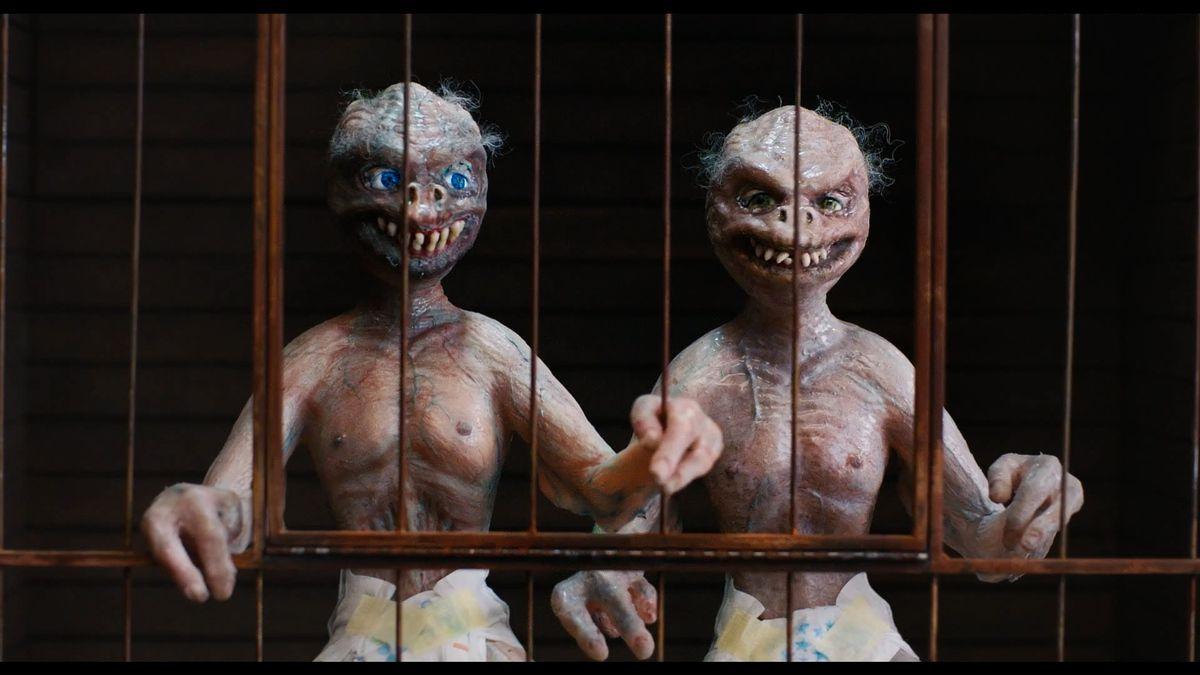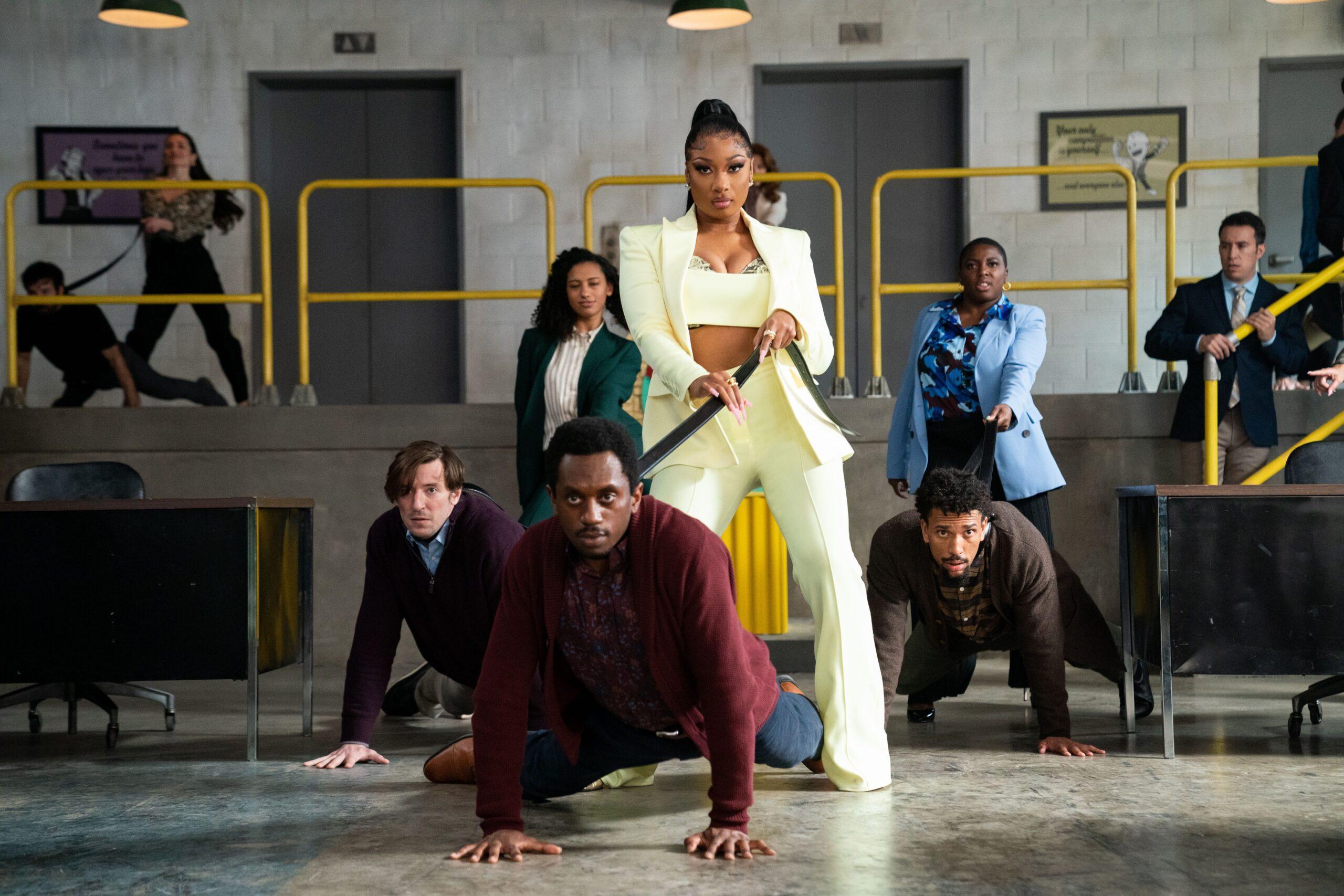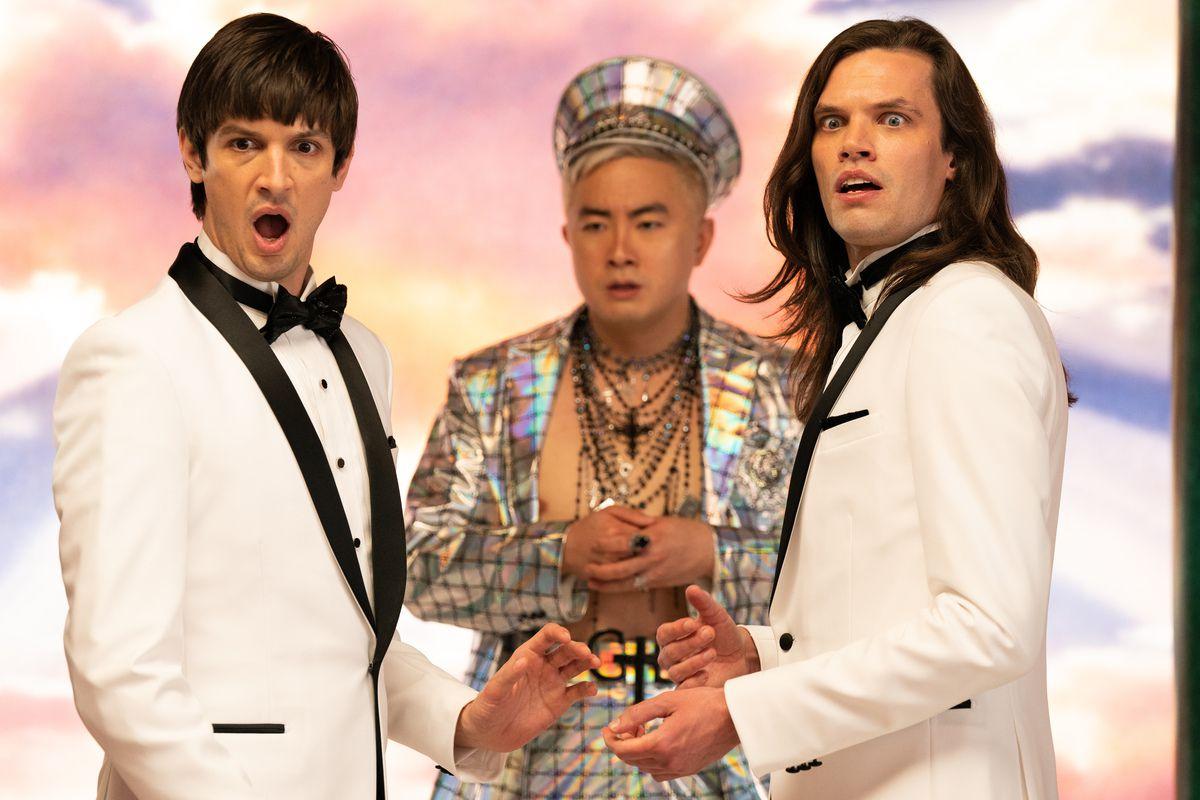The creators of A24’s absurd new romp Dicks: The Musical faced an extremely specific challenge when crafting the movie: How would they turn a 30-minute stage show about long-lost adult twins who reunite their estranged parents and fall madly in love into a 90-minute film that a Hollywood studio would agree to release?
Based on a Parent Trap riff that Aaron Jackson and Josh Sharp mounted at the Upright Citizens Brigade Theatre in New York, Dicks—original title: Fucking Identical Twins—was set up at 20th Century Fox in 2016 through a producer who had a development deal there. Even before Disney bought the company, why anyone inside Fox said yes to a bawdy musical about twincest remains a mystery. When Jackson and Sharp eventually sent the studio their script, they got a kill fee and a swift “never mind.”
In 2020, A24, a much more Dicks-y distributor, gave the movie a new home. Comedy veteran Larry Charles, best known for his work on Curb Your Enthusiasm and Borat, came aboard as director, and now the world has been gifted a spectacle that features Bowen Yang playing a glittery, gay God, Megan Thee Stallion rapping about dismantling the patriarchy, and a host of hilariously ludicrous songs. Jackson and Sharp play Trevor and Craig, blustering salesmen who meet at work, quickly discover that their kooky parents (Megan Mullally and Nathan Lane) separated them at birth, and swap identities in a ploy to rekindle the nuclear family they never had. Once they stop bragging about banging chicks and climbing corporate ladders, Trevor and Craig realize they kind of have a thing for each other. Love is love, right? More on that later.
Jackson and Sharp’s UCB show contained a rapid-fire plot and a handful of songs, written with the help of musician Karl Saint Lucy. The movie’s lead producer, Kori Adelson, linked the trio to Marius de Vries, an accomplished English composer whose credits include Moulin Rouge!, La La Land, and Madonna’s Ray of Light. They spent three days holed up in a Brooklyn recording studio, embellishing the play’s existing songs and laying down the bones for additional tracks.
“Something happened at the end of that session which I’ve never seen in my entire career,” de Vries tells The Ringer. “We sent all the music to the director, and he approved it all instantly. Normally, you’d get 26 pages of notes about what needs to change.”
Here’s the story behind Dicks, song by song. Spoilers follow.
“I’ll Always Be on Top”
Despite its wall-to-wall absurdism, Dicks borrows the story beats of a typical musical, starting with a peppy number that introduces the protagonists using easily digestible traits. In this case, Trevor and Craig are virulently—one might say performatively—straight windbags with two priorities: getting laid and competing to be the no. 1 peddler of vacuum replacement parts at a corporation called Vroomba.
“The same way that drag queens are doing femininity but not in a way that’s necessarily supposed to be believable, we are doing straight-man drag,” Jackson says. “What do men brag about? How often they fuck, how rich they are, how big their dicks are. We’re not trying to believably play a straight guy. It’s like, ‘This is what you look like to us.’”
In the stage show’s opener, “Only in It for Me,” Trevor and Craig gloat about themselves for two verses and then realize they’re twins. Under the guidance of Saint Lucy and de Vries, Dicks extends that meet-cute, more thoroughly establishing Trevor and Craig as cartoonish alphas who have more in common with college bros than with New York’s business elite. Taking the form of a lengthy suite, including an overture narrated by God, “I’ll Always Be on Top” has horns, a bass line that would make anyone want to strut around, and an energy that Jackson and Sharp describe as “groin-y.”
“From the get-go, our ambition was to be as wild and transgressive and confrontational as possible in the impact that this story had, but for that not to just turn into a juvenile insult,” de Vries says. “We had to be very thorough with the architecture of the piece, both in terms of the storytelling forms—musical theater and cinema—but also in terms of the content of the songs musically. I think we had to work even harder than normal to make them as robust and legitimate as possible to support all of the mayhem.”
“No One Understands”
Naturally, Trevor’s and Craig’s braggadocio hides their profound sadness, perfectly captured with what musical theater practitioners call an “I want” song—a first-act number that establishes emotional stakes. (Famous examples are “Over the Rainbow” from The Wizard of Oz and “Wouldn’t It Be Loverly” from My Fair Lady.) “No One Understands” starts pretty quickly after “I’ll Always Be on Top” ends, a structural tip that Jackson and Sharp got from Tony nominee Douglas Carter Beane, who gave notes on the script.
“For these guys who have everything, the one thing they don’t have is their full pathos,” Sharp says. “The overwhelming weight of having a single parent is, to them, the biggest loss they can be given by God. And musically, you can make it so much more melodramatic.”
The song ratchets up Trevor’s and Craig’s woe-is-me narcissism to the point of ridiculousness. “No one understands what I’ve been through / No one knows what it’s like to be a man with my specific life saying these specific words,” they croon before connecting the dots about their forsaken childhoods. The actors sang live on set, and if their vocals are ever imperfect, that’s part of the experience. Charles wanted the film to look and feel a bit lo-fi.
“Evelyn Song” and “Gay Old Life”
Here’s where things go berserk. After Trevor and Craig hatch their scheme of familial reconciliation, Dicks introduces us to the eccentrics who birthed these two dumbbells. Jackson and Sharp also portrayed the parents onstage, but after Mullally and Lane were cast, the characters took on a new life.
Mullally’s Evelyn is a colorful shut-in who claims to be 93 or 94 (she can’t remember which). To get a sense of what Sharp calls her “Dadaist, absurdist mind,” the writers composed a twinkling patter song wherein Evelyn details her inglorious “twilight years,” full of catheters, a detached vagina, and the many tchotchkes she assigns names to. When Mullally showed up for the first rehearsals, Jackson and Sharp learned she had decided to give Evelyn a thick, hilarious lisp. De Vries wondered whether it might make the lyrics indecipherable, but Mullally—a Broadway veteran whose breakthrough role was in How to Succeed in Business Without Really Trying—had the diction down to a T.
“These straight buffoons want the perfect parents, so they should meet the mom first, and she’s fully fucking crazy,” Sharp says of how he and Jackson envisioned the sequence. “And then you want to meet the dad and almost be like, ‘He’s normal, right?’”
Wrong. Lane’s Harris does seem like the “normal” one at first, a wannabe socialite who announces he’s queer. “Gay Old Life” is a lounge song, with Harris enumerating his upper-crust gay traditions (brunch, the symphony). Then, he reveals something far juicier: He’s harboring two Gremlins-esque creatures in a cage. “My sewer boys,” he proclaims, unveiling the wrinkly goblins as blood-guzzling inbreds fond of chewed-up deli ham that Harris spits into their mouths. “We were playing with this joke of, ‘This guy doesn’t understand gay culture,’” Sharp says. “Every verse, he’d just say different crazy shit.”

The sewer boys were mentioned in the stage show but never seen, leaving endless possibilities for the puppets that nearly steal Dicks. Adding a bit of prestige to the mix, the grotesque dolls were operated by the Bob Baker Marionette Theater, a Los Angeles–based nonprofit with illustrious screen credits like Star Trek and Close Encounters of the Third Kind.
“Lonely”
The film’s most earnest song, “Lonely,” is the catalyst through which Evelyn and Harris agree to meet for dinner at the romantic La Chateau. (Saint Lucy cameos as the restaurant’s pianist.) Jackson and Sharp initially thought the duet would be a one-dimensional gag where the characters repeat the phrase “I’m lonely” over and over, but Charles told them it needed to be a showstopper. The gambit works only if the audience cares about the pair’s reunion. They’re wacky, yes, but they’re also genuinely lonesome.
“Basically, the assignment was, ‘Here’s a page with the word lonely about 28 times, and we need to make it an R&B number,” Saint Lucy recalls. The resulting serenade gives Mullally and Lane an excuse to belt their souls out as the first act ends.
“The genius in the lyrics is the comic repetition within them,” de Vries says. “How many times can you repeat one word before it stops to mean what it used to mean? The project of the song was just to construct it so it was as sincere as possible.”
Because movies can submit only three tracks apiece for the Oscars’ Best Original Song category, A24 will have to narrow down which ones are in contention—and, per Oscar bylaws, they can’t be anything from the stage show. Jackson and Sharp suspect “Lonely” will be among the three selections, as will the next song, performed by a grande dame of rap.
“Out Alpha the Alpha”
Gloria Masters, Trevor and Craig’s bullish boss at Vroomba, did not exist onstage. Her solo in the movie, in which she tongue lashes the company’s men in the middle of the office, was originally designed as a cabaret number. Then Megan Thee Stallion got cast.
Saint Lucy and de Vries threw out everything but a couple of melodic motifs. Alongside Jackson and Sharp, they then wrote entirely new lyrics to fit the “Savage” rapper. “It was unlocked the day we realized it needs to be an early ’90s hip-hop vibe,” says Sharp, citing LL Cool J, DJ Jazzy Jeff, and the duo Charizma & Peanut Butter Wolf as inspiration. “It feels very fun and uplifting. It’s got this shuffle to it.”

To match Megan, the quartet added swagger to the lyrics (“My tuna is ahi / My beef is Wagyu”). Gloria is, after all, the CEO, content to put needy men on literal leashes. Narratively, “Out Alpha the Alpha” acts like an intermission, complete with a Busby Berkeley–lite dance sequence.
“Also, it’s one of the rare moments in the film where we do commentary,” Sharp says. “This is sort of telling you how we feel about these guys we’re playing. We thought, ‘If we do that, it still needs to be blown out.’ She needs to treat them like scummy sacks of cum, and it exists in a world where we murder every man. But even though she gets a little bit of a moral compass moment, she still needs to be a full capitalist pig who’s psycho. We can’t let her be the one nice guy.”
“The Sewer Song”
After Evelyn and Harris renew their passion (and wreck La Chateau with their horniness) in the rowdy “Desperate for Your Love,” they decide they won’t move in together—crushing news to Trevor and Craig, who insist their parents should marry so that the four of them can finally live under one roof. Evelyn and Harris shake the guys out of their funk, and the family finds itself embroiled in a different crusade: saving the sewer boys, who’ve escaped and returned to their underground lair.
“The Sewer Song” is two things. On a technical level, it’s a quodlibet that unites melodies heard in previous songs for one soaring crowd-pleaser. And in a more colloquial sense, Sharp and Jackson call it their “adventure song.” Trevor, Craig, Evelyn, and Harris dash through the bowels of a New York sewer, in the process piecing together broad life lessons and deciding what to do about these small monsters who clearly also want to rejoin their parents.
De Vries suggested elongating “The Sewer Song,” but part of what keeps Dicks from overstaying its welcome is that most of its songs last only a few minutes. By the end, it sounds like a party. Looks like one, too: Charles, master of anarchic comedy, decided the audience should feel like they’re underground with the actors. We see the puppet strings holding the sewer boys, and at one point Sharp briefly breaks character.
“The Sewer Song” is also the only track without a button, the closing downbeat that elicits applause. Instead, the movie immediately lurches forward, and before we know it, Trevor and Craig are professing their love for each other and having acrobatic sex.
“All Love Is Love”
In the world of Dicks: The Musical, God officiates gay twin weddings while wearing metallic hot pants and declares, “I’m putting this one in the Bible!” Welcome to the New New Testament.

Satirizing the inclusive platitude that gives the song its name, “All Love Is Love” is a pastiche of contemporary Christian anthems. Saint Lucy likens it to a “raucous” version of “Day by Day,” the signature hit from Godspell. At UCB, Jackson and Sharp would invite audience members to repeat the refrain—“God is a faggot, and all love is love”—and then jokingly call them bigots. In the movie, the song’s final minutes are an explosion of joy, replete with a choir and a well-timed callback to Evelyn’s pitiful vagina. Like all the gags in the movie, it works only because the music is so much better than it needs to be for something so decadently bizarre.
“The way that the humor and the music interact has got this screwball-y, 1930s, Fred-and-Ginger feel to it,” de Vries says. “Everyone thinks those were very genteel comedies, and in some respects they were. But that embrace of vaudeville, screwball, and slapstick is a fairly consistent thread throughout the film. In a weird kind of way, it gives the film a period-adjacent innocence that’s very at odds with how noisy and rambunctious and blasphemous it is.”
Matthew Jacobs is an Austin-based entertainment journalist who covers film and television. His work can be found at Vulture, Vanity Fair, The Hollywood Reporter, HuffPost, and beyond. Follow him on Twitter @majacobs.
